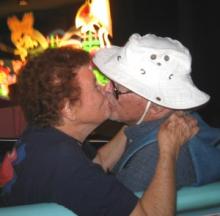To celebrate their 67th wedding anniversary, my 90-year-old dad and 87-year-old mom took their five adult children (and two of the 27 grandkids) to Disney World for a week.
Mom and Dad are old in years only. Dad has some idiopathic neuropathy in his lower legs and feet, so he now uses a cane and was in a wheelchair for most of the theme park walking. But Mom proceeded to – how can I put this nicely – kick our butts.
My parents are a model of what the research community now calls “successful aging.” They are fortunate enough to have had the same family physician for more than 20 years, who’s monitored their health (including Dad’s serious hypertension and Mom’s mild emphysema) and made a few suggestions, but who generally sits back in amazement while they forge ahead.
In the spirit of this week when we give thanks for simple things, I’ll share some of Barbara and Al Guay’s secrets for keeping young – and the evidence that proves Mom’s advice can be very good indeed.
Mental activity
What they do: Mom is an artist who finds constant joy in creating new works in ceramic. Dad went back to college after retirement to study music. Now he’s writing his memoirs of an early 1900s childhood in Montana. Both of them are usually juggling two or more books at a time.
The evidence: A 2009 study looked at 4 years of data among 1,477 Japanese elders (66 or older). Increasing exposure to intellectual activities was significantly associated with an increased chance of maintaining and even increasing their ability to live independently. “This study … provides preliminary support for promotion of exposure to intellectual activities among older adults as an opportunity to prevent disability in the older segment of the population,” the authors said (Int J Geriat psych 2009;24:547-55).
Physical activity
What they do: Go to the gym three times a week. Because of his lower extremity neuropathy, Dad concentrates on leg strength training rather than cardio, while Mom does the weight circuit and the treadmill. They bowl once a week, walk around the block, stroll the easier trails in Shenandoah National Park. And drive themselves (and their kids) to Disney World once or twice a year
The evidence: A study in press right now examines physical activity in a population of 629 Korean adults aged 65 and older. Reduced physical performance and muscle strength were significantly associated with reduced cognitive flexibility and self-efficacy. “Clinicians need to consider the association between executive function and physical performance when working to improve physical functioning in an aged population,” the authors said (Arch Geront and Geriat 2010; doi:10.1016/j.archger.2010.10.018).
Diet and smoking
What they do: Very little meat; fish several times a week; lots of fruits and vegetables; nuts, dark chocolate ,and a small glass of wine or cocktail several times a week; daily omega-3 supplements. Neither has ever smoked a cigarette.
The evidence: A 2009 review found numerous studies suggesting that diets rich in antioxidants and anti-inflammatory components – such as those found in fruits, nuts, vegetables, and spices – may lower age-related cognitive declines and the risk of developing neurodegenerative disease (J Nuerosci 2009;29:12795-801).
Social activity
What they do: Church every Sunday. Bowling with buddies every Thursday. Visits with their children and grandchildren at least once a week. Although he no longer flies a plane, Dad’s friends at the local flight club keep him aloft with short trips up and down the Eastern Seaboard. Mom attends art shows where her pieces often take center stage.
The evidence: In 2009, a study examined the associations between social relationships and positive perceived health among almost 25,000 Thai elders. Friendship networks, informational and emotional support, and social engagements were positively associated with good perceived health. “Healthcare professionals should target the promotion of friendship networks, social support, and health-promoting behaviors, especially focusing on the oldest old, uneducated, poor, and elders with a disability,” the authors said (Nurs Health Sci 2009;11:144-149).
Sexual activity
What they do: I can’t hear you – my fingers are in my ears. Let’s just say there is still some giggling going on.
The evidence: Just last month, a South Korean cross-sectional study found that elderly married people (mean age 72 years) who maintained an active sexual life had significantly higher self-esteem than those who did not (Arch Gerontol Geriatr 2010; doi:10.1016/j.archger.2010.08.011 ).
Among the 156 subjects interviewed, 78% reported an active sex life, with nearly half engaging in sexual activity 2-3 times each month. “Health experts need to educate and counsel the elderly about their sexual lives to foster high-quality, healthy elderly lifetimes,” the authors said.
But the authors said much more research is necessary, especially given the “Elderly Boom” going on worldwide. Since I wasn’t able to find many studies on sexuality in the aged, I must agree that this is a topic ripe for scientific exploration. But if you study my parents – please don’t let me know.
- Michele G. Sullivan (on Twitter @MGSullivan)


